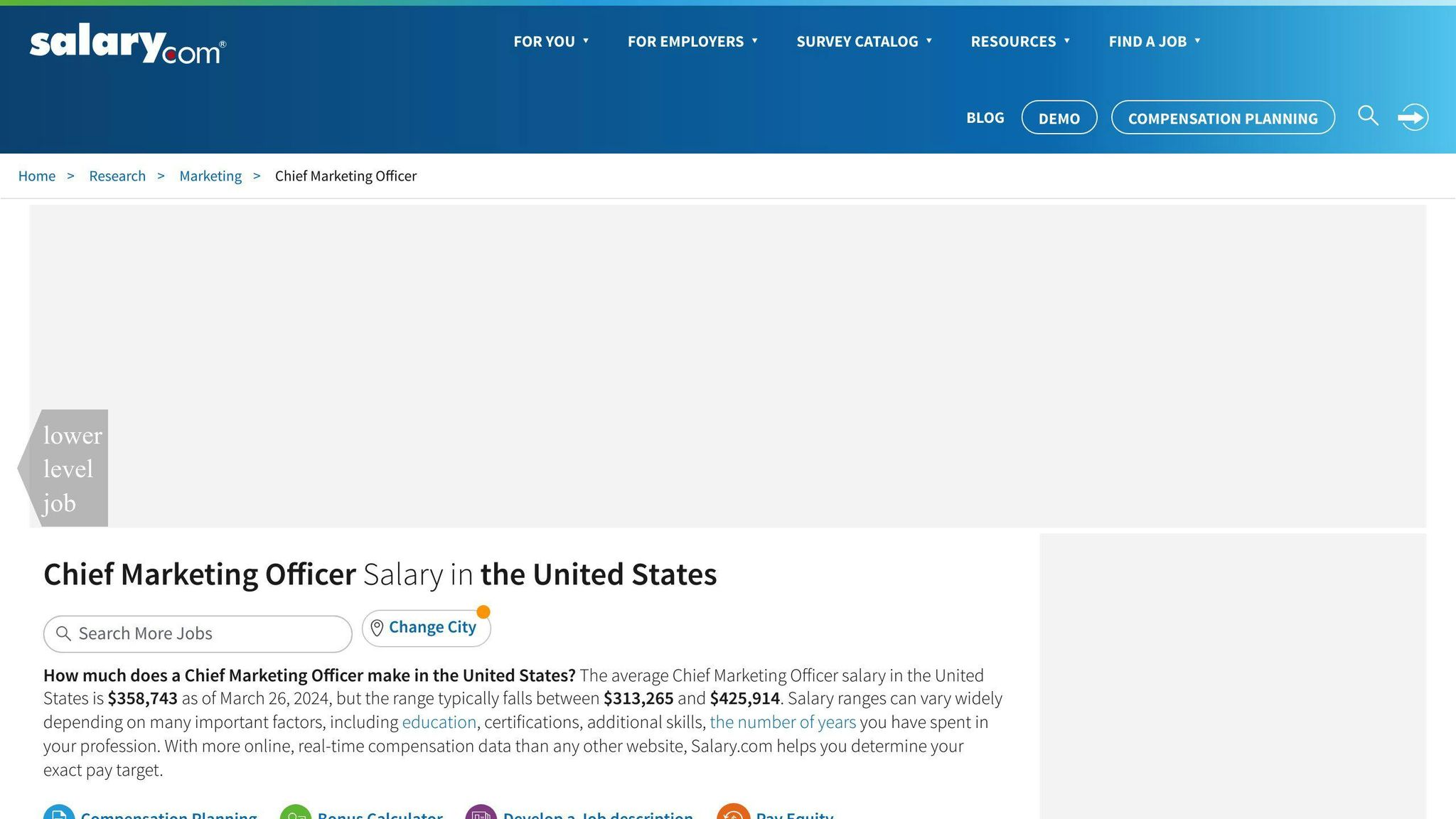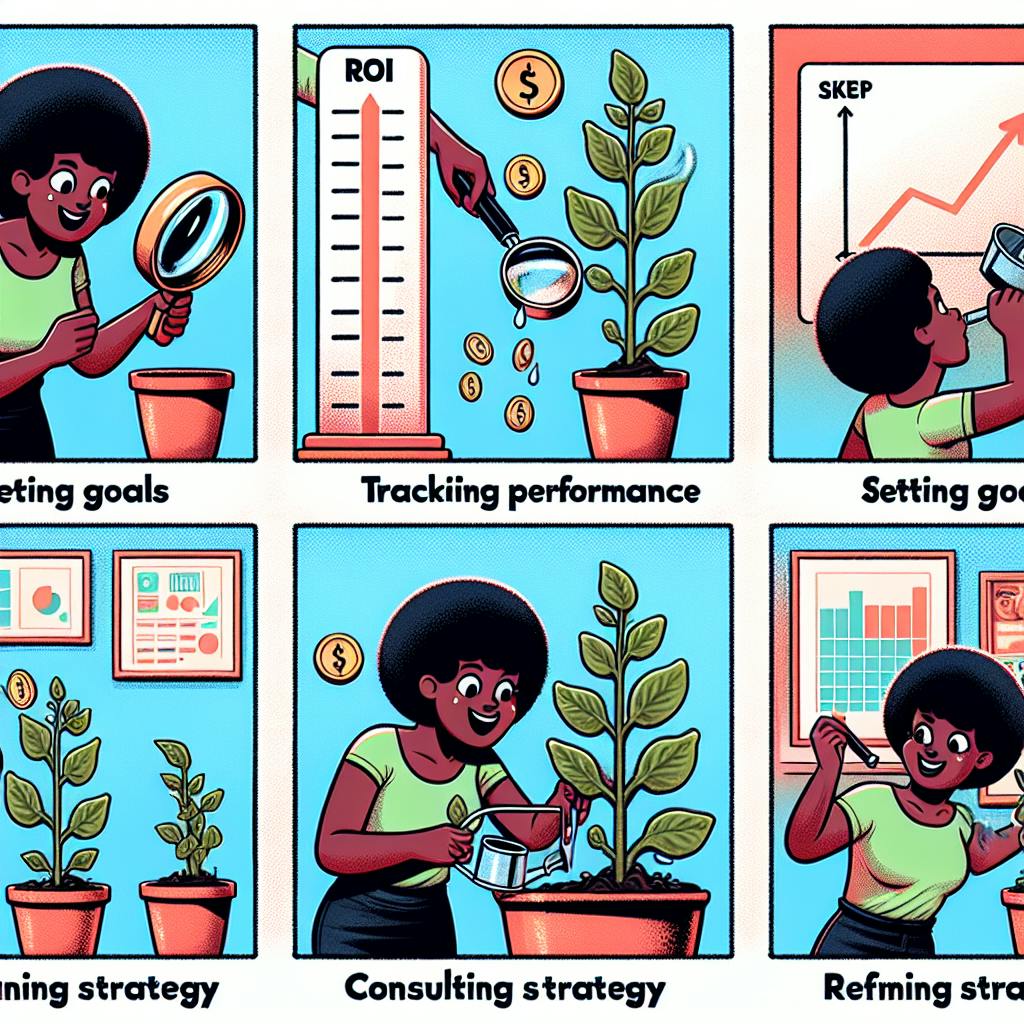Hiring an Outsourced Chief Marketing Officer (CMO) can be a game-changer for businesses looking to grow without the high costs of a full-time executive. These experts bring fresh perspectives, strategic marketing insights, and a wealth of experience to help companies stand out, reach more customers, and drive sales. Here's what you need to know:
- Cost-Effective: Outsourced CMOs are more affordable than full-time hires, saving you on salaries and benefits.
- Strategic Impact: They offer tailored strategies for market positioning, customer engagement, and sales velocity.
- Flexibility: You can engage an outsourced CMO based on your needs and budget.
- Broad Expertise: They bring diverse experience from working with various businesses and industries.
- Fresh Ideas: Outsourced CMOs can provide new perspectives that internal teams might miss.
Whether it's through developing a unique brand identity, expanding into new markets, or implementing data-driven marketing strategies, outsourced CMOs can significantly contribute to your business growth. The choice between an in-house and an outsourced CMO depends on your company's specific needs, goals, and budget constraints.
Historical Context
- The idea of having a CMO started in the 1990s when businesses wanted someone to focus just on marketing.
- At first, CMOs were usually people already working at the company, taking care of everything marketing-related for a long time.
- They handled things like making the brand look good, figuring out what customers want, ads, and making the company more popular.
- But when money got tight around 2008, companies started to think about hiring outside help to save costs.
The Rise of Outsourced CMOs
- Now, more than half of businesses use CMOs who aren't full-time employees but come from outside.
- These outsourced CMOs work on special projects or for a short time, which can save money and bring in new ideas.
- They're great because they can jump in with their special skills whenever needed, and they're not as expensive as having someone all the time.
- Reports say this way of hiring CMOs is getting more popular, growing by about 15% every year.
- The Covid-19 pandemic made even more companies try out hiring marketing help remotely.
Today, with businesses always trying to keep up and stand out, having an outsourced CMO can be a really smart move. They bring in fresh thinking and are flexible, which is perfect for companies looking to grow and stay ahead.
Case Study 1: Making a Startup Stand Out
Startup X is a new company that created an app for people to keep all their loyalty rewards from different stores in one place. At first, they thought users would love the app because it made things simpler and saved time. But, after 6 months, not many people were using it.
The founders decided to get help from Jane, a marketing expert who doesn't work in the company but helps when needed. Jane looked into why the app wasn't catching on. She found out that while young, tech-savvy people liked the app for its convenience, it wasn't appealing to everyone else.
Jane suggested changing the app's message to focus on saving money by not missing out on rewards. This new angle aimed at older users who weren't as comfortable using technology but liked the idea of saving money. Jane showed that these users could bring more value over time because they were looking for ways to maximize their rewards but didn't have many options.
Jane worked with the teams responsible for the app's look, its marketing, and user experience to change how the app talked about itself. They added new features like alerts for when rewards were about to expire, making it clear the app could help users get more from their rewards.
This big change led to a 38% jump in users from the targeted group in 9 months. By focusing on helping users save money and get the most out of their rewards, the app became more popular. This move helped Startup X reach more people, get more app downloads, and make more money.
Case Study 2: Accelerating Business Growth
ABC Services, a company that's been around for 10 years offering IT support and cloud solutions, was doing okay but wasn't growing much anymore. They wanted to reach more customers and make more money, so they decided to get some expert help.
They brought in Emma, a marketing pro with lots of experience, especially with businesses that sell to other businesses. Emma started by really digging into who ABC's customers are and what the market looks like. She found out a few important things:
- Other companies offering similar services were moving into areas where ABC wasn't yet.
- Customers wanted cybersecurity services, which ABC wasn't offering.
- The sales team needed better tools and information to help them sell more effectively.
Executing Expansion Into New Markets
- Emma helped ABC start doing business in 2 new states.
- She set up online marketing efforts in those new areas to show off ABC's good work and know-how.
- Made sure ABC's website was easy to find and use for people in those new places.
- Organized local marketing activities to get the word out and bring in new customers.
Introducing New Revenue Streams
- Looked into what customers needed and how ABC could stand out by offering cybersecurity.
- Teamed up with top companies in the cybersecurity field.
- Made new marketing materials focused on cybersecurity.
- Taught the sales team about the new cybersecurity services.
Enabling Sales With Content & Messaging
- Worked closely with the sales team to figure out what information they were missing.
- Created over 20 pieces of content like articles and guides to help the sales team sell better.
- Made special sales materials for different types of customers.
- Organized a big meeting to teach the sales team new selling strategies.
In the first year after Emma joined, ABC managed to move into 2 new states, add cybersecurity to their services (which made up 15% of their income), and got 20% more new customers thanks to better sales support.
Emma's work was key to finding new ways for ABC to grow. She used her marketing skills to help the company move into new areas, offer new services, and support the sales team, leading to a big boost in business.
Case Study 3: Gaining Competitive Advantage
ABC Fashions, a store selling women's clothes with over 50 locations in the Midwest, was doing okay but not growing. They hired Emma, an expert in marketing from outside the company, to help them do better and beat online stores that were taking their customers.
Challenges
- Sales hadn't gone up in 3 years
- New online shops were taking away customers
- They needed to stand out more
- The store's brand wasn't very clear or strong
Emma's Strategy
Emma looked closely at what customers liked and what was happening in the market. She found out:
- People liked the experience and help they got in the stores
- Online competitors didn't have physical stores, which was something special ABC had
- They needed to connect their in-store and online shopping better
Her main ideas were about using ABC's stores to make shopping there feel special:
Develop Distinct Brand Identity
- Make the store's message about personal help, being part of the community, and knowing a lot about fashion
- Make the stores look nicer and more welcoming
- Train employees to be really good at sharing the store's vibe
Enhance Omni-Channel Experience
- Make the website work better with the stores
- Let people buy online and pick up in the store
- Use a CRM system to keep track of customer info both online and in-store
Grow Community Engagement
- Start a loyalty program with cool benefits
- Have events in the store to make customers feel connected
- Work with customers and influencers to share their experiences
Results
In a year and a half, ABC Fashions saw:
- Sales went up by 30%
- Profits increased by 15%
- Online sales got way better
- They became the top store in their area
By focusing on what makes them unique, like their in-store service and community, ABC stood out. Emma's plan helped them blend their online and in-store shopping, leading to more sales and growth. Hiring an expert like Emma was key to finding new ways to do better and stand out in a busy market.
Comparing In-House vs. Outsourced CMO

When a company needs to decide if they should hire a Chief Marketing Officer (CMO) to work just for them or hire one from outside, there are a few things to think about:
| Metric | In-House CMO | Outsourced CMO |
|---|---|---|
| Cost | High salary plus extra costs like benefits | Usually costs 30-50% less |
| Availability | Takes a long time to find and hire | Can quickly find someone ready to work |
| Skills | Limited to what one person knows | Can tap into a wider set of skills from different projects |
| Fresh Ideas | Might get stuck in old ways | Brings new ideas and views |
Cost
Hiring a CMO to work only for your company means you're paying a big salary, benefits, and other costs related to employees. The average salary for a CMO can be more than $200,000.
On the other hand, hiring a CMO from outside the company for certain projects or on a regular basis can save a lot of money. You don't have to worry about the extra costs that come with hiring a full-time employee.
Availability
Finding the right person to be your CMO can take a lot of time and effort. It might take months to find someone who fits well.
But, if you go with an outsourced CMO, there are networks of experienced marketing pros ready to jump in. This means you can have someone helping you much faster.
Skills
An in-house CMO has their set of skills, but those might not grow much over time. They know what they know, and that's it.
Outsourced CMOs, though, work with different companies and on various projects. This means they're always learning new things and can bring a wide range of skills to the table.
Fresh Ideas
Someone who's been with a company for a long time might not see new opportunities or get stuck in the same old patterns.
A CMO from outside the company doesn't have those blind spots. They can look at the company with fresh eyes and suggest new ways to grow, improve customer engagement, and get ahead of competitors.
In short, hiring an outsourced CMO can give a company more flexibility, a broader set of skills, and can be more cost-effective. However, some companies might still prefer having a CMO who's there all the time. It's all about what's more important to your company: saving money, getting new ideas, or having someone fully dedicated to your team.
Best Practices for Success
Outsourced CMOs use smart ways to help businesses grow and beat the competition. Here are some key steps to make sure working with an outsourced CMO goes well.
Implementing Data-Driven Approaches
- Look deeply into the market, what customers want, and what competitors are doing. Use this info to make smart decisions.
- Keep an eye on how well marketing efforts are doing, like how many sales they're bringing in and if they're worth the cost.
- Always be ready to make changes based on what the latest data shows.
Employing Agile Marketing Principles
- Try things out and see what works, then make it better bit by bit.
- Start small to test ideas before spending a lot of money.
- Be ready to change plans quickly if the market shifts.
Structuring the Engagement for Maximum Impact
- Make sure everyone agrees on the goals.
- Have regular meetings to check on progress and solve any problems.
- Work well with other teams in the company.
- Plan for the long run to make sure all the big plans happen.
Providing Hands-On Implementation Support
- The outsourced CMO should give clear plans and creative ideas.
- Offer specific advice on how to do things.
- Teach the company team how to keep the marketing going.
By bringing in outside experts and working closely with them, companies can really make a difference. Keeping everyone on the same page, being ready to adjust, and basing decisions on solid data are key to making this relationship work.
sbb-itb-5c5ac24
Selecting the Right Outsourced CMO
Choosing the right outsourced CMO is super important if you want to boost your marketing and grow your business. When looking for the best person for the job, consider these five key areas: their experience in your industry, what they're good at, their success stories, how well they fit with your team, and how you'll work together.
Relevant Industry Experience
Find someone who knows a lot about your field. They should understand who your customers are, who you're competing with, and what's happening in your industry. This helps them get straight to work on making your marketing better.
For instance, if you're a tech company, you'll want someone who's all about tech and understands how tech customers think. But if you're a store, you might want someone who knows how to draw in shoppers both online and in person.
Strong Capability Fit
Make sure the outsourced CMO can do what you need. Look at what they're best at, like making cool ads, writing great content, or figuring out the numbers behind your marketing.
Choose someone who's really good at the things that matter most for your goals, like getting more people to buy your product or making your brand more popular.
Proven Track Record
Check that they've helped other businesses grow. Ask for stories and numbers that show they know how to make a difference. You'll want to hear about how they've made companies more money, brought in more customers, or made a brand more well-known.
Cultural Alignment
It's important that they get along with your team and share your company's values. If they work and think in a way that fits with your company, everything will go smoother.
Structured Engagement Model
Be clear about what you expect from them and what they need to do. Talk about what's most important, how much money you can spend, and how you'll check if things are working.
Make sure they can work well with your team and use your tools. Set up a plan so everyone knows what's happening and can keep things moving forward.
Following these tips can help you find the right outsourced CMO. This means you get top-notch marketing help without the extra costs or hassle.
Conclusion
Hiring an outsourced Chief Marketing Officer (CMO) is a smart move for businesses looking to grow quickly and get ahead of the competition without spending a lot of money on a full-time marketing boss.
This approach brings in experts who know how to:
Market Positioning and Messaging
- Help your business stand out to the right customers
- Make sure your business's message hits home with those customers
- Keep your story straight and strong wherever you're talking to customers
Business and Revenue Growth Strategy
- Look closely at the market to find new chances for growth
- Plan how to move into new areas or start selling new things
- Bring in new ways to make money
Sales Velocity
- Give your sales team the tools and messages they need to sell better
- Help them understand and share your product's value
- Make the sales process smoother and more effective
Customer Engagement and Loyalty
- Make online interactions better and more enjoyable
- Build a community of fans and supporters
- Start programs that reward customers for sticking around and spreading the word
Digital Innovation
- Use quick, flexible marketing methods to boost sales
- Use data to keep getting better at what you do
- Stay ahead by using the latest tech
By bringing in an outsourced CMO, companies can grow faster, keep up with the big players, and stay sharp in the competition. This expert advice and fresh perspective can be a huge help for business leaders aiming to reach their highest potential.
In today's fast-paced business world, hiring a part-time executive for marketing can really help ambitious businesses grow, no matter their size or stage.
Real-Life Success Stories
Outsourced CMOs have made a big difference for many companies in different kinds of work. Here are some clear examples showing how these marketing experts have helped businesses grow:
Making More Money
- A company that sells software to other businesses saw its yearly income go up by 23% after hiring an outsourced CMO. This expert helped them explain their product better and reach the right customers.
- A store with several locations increased its sales by 15% in one year with the help of a part-time CMO. They made their loyalty program better and improved how customers feel when they visit the stores.
Growing Bigger in the Market
- An online shop got bigger in the market by 9% in two years thanks to a marketing expert. This person looked at the market carefully and found new places where the company could sell its products.
- A company that offers tech services started winning big contracts and grew its market share from 5% to 8% nationally. This was possible because of the digital marketing skills and contacts of their outsourced CMO.
Getting More Website Visitors
- A company that sells things through a subscription got 210% more people visiting their website without paying for ads. This happened after a marketing expert helped them get better at SEO and creating content that people want to read.
- An industrial services company saw four times more visitors from social media and doubled the number of people who buy something after visiting their site. This was because an outsourced CMO made a plan that worked well across different online platforms.
Selling More Online
- A small online store saw its sales go up by 52% in a year. This boost happened because their part-time CMO made the website easier to use and better at turning visitors into buyers.
These stories show how hiring an outsourced CMO can help a business do better in many ways, from making more money to getting more people to visit their website.
Frequently Asked Questions
Here are some common questions and simple answers about hiring an outsourced or part-time Chief Marketing Officer (CMO):
What is the difference between an outsourced CMO and a fractional CMO?
The main difference is about how much time they work with you:
- Outsourced CMO: They work on specific projects. When the project is done, they're done too.
- Fractional CMO: They work with you on a regular basis, like a few days a week or a few days a month, and they act as part of your team.
What are the typical cost models?
There are a few common ways to pay:
- Retainer: You pay a set amount every month for a certain number of hours.
- Project Rate: You pay by the hour for each project.
- Value-Based: The fee depends on how well the project does.
Retainers usually cost between $5,000-$15,000+ a month for 10-30 hours. Hourly rates for projects can be between $150-$500 depending on their experience.
What experience should an outsourced CMO have?
They should have at least 5 years of experience in a top marketing job, like CMO or VP of Marketing, at a company that's growing fast. They should be good at planning, analyzing, and getting things done. They should also know a lot about digital marketing and the latest marketing trends.
How can I validate their track record?
- Ask for references: Talking to people they've worked with before can tell you a lot.
- Review portfolio: Look at what brands and campaigns they've worked on and see if they show real results.
- Confirm capabilities: Make sure they've done the kind of work you need before.
- Share industry background: Check if they have experience in your specific field.
What questions should I ask during the vetting process?
- How do you plan to start working with us?
- How will you get to know our team?
- How will we set and track goals?
- How do you keep improving over time?
- Can you tell me about a tough problem you solved for another client?
- What makes your way of increasing business growth special?
Making sure you pick the right outsourced CMO means finding someone who fits well with your team, knows what they're doing, and has a clear way of helping your business do better.
Related Questions
What does an outsourced CMO do?
An outsourced CMO is like a part-time marketing boss for companies. They help with big-picture planning, making sure a company's message hits the mark, overseeing marketing efforts, and helping sales teams do better. They bring fresh ideas from their wide experience and help make smart moves based on data.
What is the strategic role of chief marketing officer?
The main job of a CMO is to help a company grow and stand out from the competition through smart marketing. They work on:
- Crafting messages that speak to the right people
- Keeping an eye on market trends and finding new opportunities
- Leading marketing efforts and content creation
- Understanding customer needs and market data
- Matching marketing plans with the company's goals
- Making partnerships to reach more people
Their goal is to create more demand for what you're selling, make your brand stronger, and help the sales team close deals faster.
What are the benefits of having a chief marketing officer?
Having a CMO can really make a difference by:
- Making your brand and messages stronger
- Boosting sales and making more money
- Getting to know your market and customers better
- Using data to spend your marketing budget wisely
- Setting you apart from competitors
- Giving your leadership team more support
- Finding and acting on opportunities to grow
With a CMO, your marketing efforts are more focused and effective, helping your business do better.
What is the CMO of marketing strategy?
The CMO's marketing strategy is all about understanding customers and the market to grow the business. It focuses on:
- Making people aware of and prefer your brand
- Turning interest into actual sales
- Keeping and growing relationships with current customers
- Using data to make better spending decisions
It's about seeing the whole picture of how customers interact with your business and finding ways to grow.



